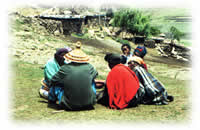 |
 |
||
 |
|||
|
RELATED THEMES culture and customs employment and income social institutions social relationships OTHER LOCAL THEMES BACKGROUND |
community activities
People still do letsema at weddings and at the time of someone's death, when it is called ho hata maoto. Women apparently perform letsema for tasks such as hoeing and one narrator describes how women of the village recently came to his aid and helped to gather firewood for his family because of his wife's illness. Two narrators mention that communal help between villages sometimes takes place. Burial societies are the main collective organisation (see Social institutions). At the times of someone's death, burial is not the responsibility of the family alone; the chief gives guidance to others in the community who collectively carry out the task. quotes about community activities"We live well together [with other villages in this area], we still help one another, they always come to help us with hoeing. A person would leave her home area and come and help me hoe like that. Well, when I harvest I would also see as to what I can give her. I am still expecting [such help] can happen, but now I no longer have trust that they shall happen. ... I am going to people whom I do not know, whom I am not used to, now I do not know how we shall [behave] to one another [when we are resettled]." "There at so and so's field, we are going to ho hata maoto... Yes, this thing of ho hata maoto when a person has died, people will go to that field, whether it will be with four of five spans of cattle, it does not matter. They will go there and plough that field until they have ploughed the whole field that day. Food will be cooked for that field, and it will be eaten right there at the field until it is finished." |
|
 Letsema (plural matsema) is the practice of people coming together to work collectively to complete some task; in return for this assistance, the person who has called for it is expected to provide food for everyone. It appears that in previous times there was a great deal of communal work, and a few narrators talk as if it is still usual. However, people are becoming more inclined towards waged labour (sekoropo). One narrator (Lesotho 21) explains
Letsema (plural matsema) is the practice of people coming together to work collectively to complete some task; in return for this assistance, the person who has called for it is expected to provide food for everyone. It appears that in previous times there was a great deal of communal work, and a few narrators talk as if it is still usual. However, people are becoming more inclined towards waged labour (sekoropo). One narrator (Lesotho 21) explains